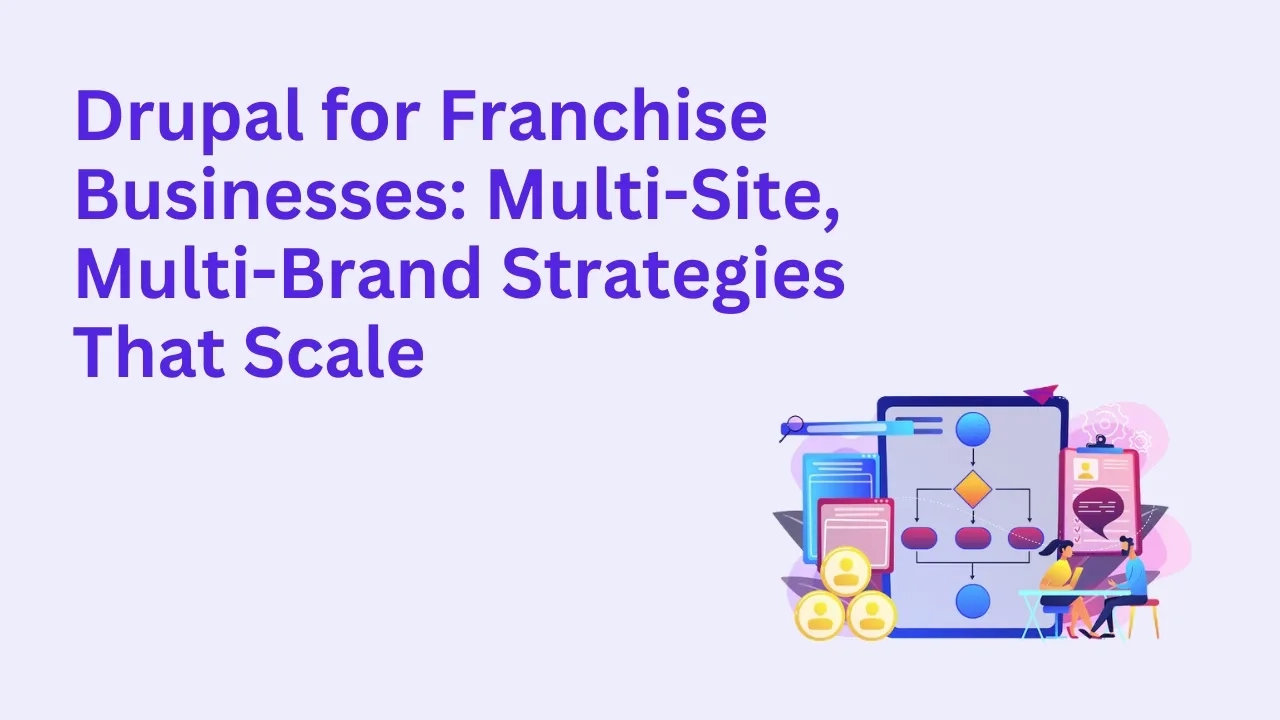Drupal for Franchise Businesses: Multi-Site, Multi-Brand Strategies That Scale

Franchise and multi-brand businesses face unique digital challenges: how do you manage dozens (or hundreds) of websites, ensure brand consistency, localize content, and scale updates all without blowing your budget or IT resources?
Enter Drupal an enterprise-grade CMS built for complex, multi-site, multi-brand ecosystems. Whether you're running a restaurant chain, healthcare franchise, or national retail network, Drupal can power a scalable, centralized digital strategy with maximum flexibility.
The Franchise Business Challenge
Franchise and multi-brand operations typically deal with:
Dozens or hundreds of microsites
Need for central brand control with local flexibility
Varying content, promotions, and languages by region
Independent location owners who need access, but not total control
Complex workflows between corporate, regional, and store-level teams
Drupal solves all of this — without custom-coding 50+ sites.
Why Drupal is Ideal for Franchise & Multi-Brand Businesses
1. Multi-Site Architecture
Drupal allows you to run multiple websites off a single codebase.
Manage 10, 100, or 1,000+ sites with shared features
Spin up new franchisee sites in minutes
Apply global updates (modules, security) from one place
Host each domain or subdomain independently if needed
Example: [brandname.com], [brandname.com/newyork], [subbrandname.com]
2. Brand Consistency with Local Customization
Using Configuration Management and Theme Inheritance, you can:
Lock global brand elements (logos, fonts, layouts)
Allow local admins to manage content, promos, team info, etc.
Reuse components like banners or CTAs, but change the messaging per location
Launch seasonal campaigns across all stores from HQ
This ensures a uniform brand voice while empowering local engagement.
3. Role-Based Access for Franchise Owners
With Drupal's granular User Roles and Permissions, you can:
Give store owners access only to their site’s backend
Restrict changes to design or core settings
Create workflows for approval before publishing updates
Enable tiered access for corporate, regional, and store staff
This keeps control centralized while avoiding bottlenecks.
4. Content Syndication and Distribution
Franchises often want to publish content across locations.
Drupal lets you:
Publish corporate news or offers to all local sites
Schedule localized content from the main CMS
Use Entity Share or Content Sync modules to distribute content
Apply A/B testing at scale with tools like Acquia Lift
5. Multilingual and Multiregional Support
For international franchises, Drupal supports:
Native multilingual content handling
Locale-specific SEO structures (hreflang, alternate URLs)
Country/region-specific promotions and content
Currency and tax handling via Drupal Commerce
Perfect for global restaurant chains, healthcare providers, or e-commerce networks.
6. Headless and Decoupled Flexibility
Want to power mobile apps or POS systems too?
Drupal’s API-first approach makes it easy to:
Deliver content to mobile apps, kiosks, or IoT screens
Integrate with CRMs, ERPs, or inventory systems
Connect local store data to centralized dashboards
Real-Life Examples
Many well-known brands use Drupal to manage large franchise systems:
Domino’s Pizza (multi-site marketing)
Timex (global e-commerce by region)
McDonald’s Australia (localized menus and stores)
The Economist Group (multi-brand publishing network)
These brands leverage Drupal to unify global experience while adapting to local demands.
Final Thoughts
Franchise and multi-brand businesses need more than just a CMS — they need a digital operating system that scales with their footprint. Drupal delivers:
Centralized control + local empowerment
Brand consistency + content flexibility
Scalable, secure, and future-ready infrastructure
Power Your Franchise Network with Drupalify
At Drupalify, we specialize in scalable Drupal implementations for multi-location businesses and franchises.
🔗 Custom multi-site setup
📦 Content sharing and localization
🎯 Workflow automation
📈 Growth-ready infrastructure








